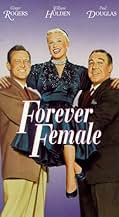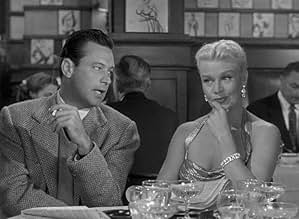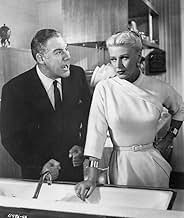Ajouter une intrigue dans votre langueAn aging actress refuses to admit she is too old to play the ingénue role anymore.An aging actress refuses to admit she is too old to play the ingénue role anymore.An aging actress refuses to admit she is too old to play the ingénue role anymore.
- Réalisation
- Scénario
- Casting principal
- Récompenses
- 1 victoire au total
Marion Ross
- Patty
- (as Marian Ross)
Brandon Beach
- Diner at Sardi's
- (non crédité)
Paul Bradley
- Actor in Play
- (non crédité)
James Carlisle
- Diner at Sardi's
- (non crédité)
Steve Carruthers
- Theatre Patron
- (non crédité)
Oliver Cross
- Club Patron
- (non crédité)
Avis à la une
This 1954 film features Ginger Rogers and William Holden with a nice supporting role played by Paul Douglas as Ginger Roger's ex-husband. Ginger Rogers was in her early forties at the time of this film and played an actress not totally accepting of her age. The public still loved her but playing a 29 year old was beginning to strain credibility. William Holden played an unknown playwright with a play featuring the relationship of a 19 year old and her mother. The role was rewritten so that Ginger Rogers could play a 29 year old, once again. Won't go further into the story but I found it interesting that Ginger Rogers was brave enough to play a role like this where age was a focus. It was a surprise to see an older Ginger Rogers after only having seen her earlier movies. Overall this film was entertaining with a nice mix of comedy and drama. Well worth the time to watch.
This film was made in the shadow of ALL ABOUT EVE, and paints a more benign view of that film's central situation. Ginger Rogers plays a leading Broadway star, who retains a close relationship with her former husband (Paul Douglas), and works closely with playwright William Holden (possibly a softer build-up for his play director in Bing Crosby's/Grace Kelly's THE COUNTRY GIRL). Pat Crowley, a younger woman of some acting talent, is trying to break into the circles that cast and produce Broadway plays (she is doing mostly off-Broadway work). The relationship of these four characters are the basis of this comedy.
There are differences between the situation here and the situation in EVE. There was more of an atmosphere of the theater and it's traditions in EVE (because Joseph Mankiewicz writes literate scripts, and was determined to show what goes on behind the stage curtains). But there Bette Davis has gotten trapped into a lonely greatness on stage, and she turns out to be willing to vacate her pedestal if she can have a human life with Gary Merrill. She just does not like the way Anne Baxter is trying to replace her in her parts - Baxter's underhanded methods are despicable. Crowley is not Baxter. She genuinely admires Rogers, and just wants entry (which she may get through Holden). It is just that Rogers is still clinging to her youth - Holden is her last chance for such a cling when they go out together. But even Rogers realizes that she is beyond the point of return. In fact, towards the end of the film the audience and Holden and Crowley discover that Rogers actually gives herself a long summer vacation where she can wear softer, easier clothing and eat as much as she wants to. In the end she accepts that the scepter is passed, but she still has her old husband/friend/and continuous argument partner Douglass to play with.
There are differences between the situation here and the situation in EVE. There was more of an atmosphere of the theater and it's traditions in EVE (because Joseph Mankiewicz writes literate scripts, and was determined to show what goes on behind the stage curtains). But there Bette Davis has gotten trapped into a lonely greatness on stage, and she turns out to be willing to vacate her pedestal if she can have a human life with Gary Merrill. She just does not like the way Anne Baxter is trying to replace her in her parts - Baxter's underhanded methods are despicable. Crowley is not Baxter. She genuinely admires Rogers, and just wants entry (which she may get through Holden). It is just that Rogers is still clinging to her youth - Holden is her last chance for such a cling when they go out together. But even Rogers realizes that she is beyond the point of return. In fact, towards the end of the film the audience and Holden and Crowley discover that Rogers actually gives herself a long summer vacation where she can wear softer, easier clothing and eat as much as she wants to. In the end she accepts that the scepter is passed, but she still has her old husband/friend/and continuous argument partner Douglass to play with.
When we see the middle-aged actresses of today facelifting and botoxing themselves to stay bankable, this movie still speaks to females feeling forced to appear forever young.
The ending/solution to the central plot is glaringly obvious from almost the get go and the movie ends exactly where you think it will for all of the main characters.
Still I found myself enjoying folks I like to see (Ginger Rogers, William Holden, and Paul Douglas) and actually felt moved by the decision of the Ginger Rogers character.
I wouldn't say this is feminist, but an early acknowledgement of the uphill battle aging females face in stardom and in real life worth watching at least once.
The ending/solution to the central plot is glaringly obvious from almost the get go and the movie ends exactly where you think it will for all of the main characters.
Still I found myself enjoying folks I like to see (Ginger Rogers, William Holden, and Paul Douglas) and actually felt moved by the decision of the Ginger Rogers character.
I wouldn't say this is feminist, but an early acknowledgement of the uphill battle aging females face in stardom and in real life worth watching at least once.
As an actress I have often admired Ginger Rogers. I am one of the few who think the films she made after the musicals she made with Fred Astaire are better than all that Art Deco Camp that still in some quarters has dominated her reputation. To name two only, ' Storm Warning ' and ' Tender Comrade '. She excelled as a witty serious actress, and when given the chance was riveting to watch. In this film she gives an exceptionally brave performance realising that a woman in the cold world of show business does not have to be, or should be always ' 29 '. Other people have remarked upon the certain similarities with ' All About Eve ' and there are some, especially with the main content being a new and apparently brilliant actress wanting to take her place in a stage play. This film is sexually bolder as Rogers plays a woman who unashamedly has had a sting of younger lovers with her ex-husband still very much an emotional focal point in her life. and she plays this up in many ways that Bette Davis in ' All About Eve ' could not have done. Rogers has a stronger sexual presence and shows it. The other brave aspect is her recognition that time is not on her side and the scenes where she admits that are truly moving, and without histrionics. William Holden is her latest conquest but his acting in the film does not match hers. He is also encumbered with many scenes with the aspiring young actress played very badly by Pat Crowley. She is nowhere in the same range of acting ability as Anne Baxter opposite Bette Davis. I am not sure if Irving Rapper the director was responsible but Pat Crowley was miscast and what could have been a very good film with a fine script loses much of its force and poignancy. I give it an 8 for the script itself, for Paul Douglas as the ex-husband and for the excellent Ginger Rogers.
An aging stage star tries to hold on to ingénue roles. The screenplay is by the Epstein twins (Casablanca) based on a play by Barrie (Peter Pan). Given such pedigree, this comedy falls short of expectations but it is fairly enjoyable and has witty dialog. It's helped by good acting from Rogers as the actress in denial about her advancing years, Douglas as her supportive ex-husband, and Holden (on the verge of super-stardom) as a writer. A screen shot at the end of the film touts Crowley as a future star at Paramount. She never became a star, but she went on to have a long TV career, and she is winning here as a perky young actress.
Le saviez-vous
- AnecdotesSir James M. Barrie's original play, which is a short piece of less than an hour in length, dates from 1912 and is set in a small rural boarding-house "far from London", where a famous actress has elaborately disguised herself as a dowdy middle-aged type in order to escape from adoring admirers and her frantic celebrity lifestyle in the metropolis. As this indicates, this movie adaptation is a very free one.
- GaffesCrux of plot hinges on efforts of a Broadway producer and playwright to find ideal actresses to star in a play about a troubled mother/daughter relationship. Yet when the pair attends a summer stock production of the play, large poster outside theatre only includes photos of actress playing daughter and two male co-stars - completely ignoring actress who plays crucial mother role that's been talked about throughout entire film.
- Citations
Clara Mootz aka Sally Carver: How many drinks have you had, Mr. Phillips?
E. Harry Phillips: Innumerable. And the fact that I can still say "innumerable" suggests that that's nowhere near enough!
- Crédits fousIn the end credits, Pat Crowley is billed as "A future Paramount star".
- ConnexionsReferenced in Discovering Film: William Holden (2015)
Meilleurs choix
Connectez-vous pour évaluer et suivre la liste de favoris afin de recevoir des recommandations personnalisées
Détails
- Date de sortie
- Pays d’origine
- Langue
- Aussi connu sous le nom de
- Forever Female
- Lieux de tournage
- Société de production
- Voir plus de crédits d'entreprise sur IMDbPro
- Durée
- 1h 33min(93 min)
- Couleur
- Rapport de forme
- 1.37 : 1
Contribuer à cette page
Suggérer une modification ou ajouter du contenu manquant





































